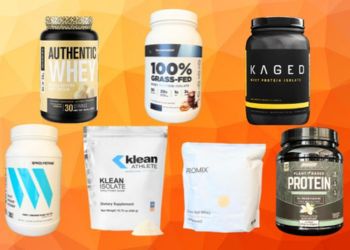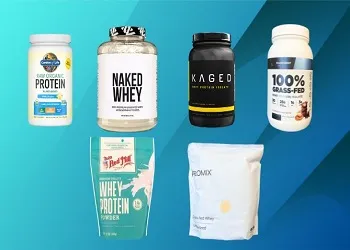We’ve all been there. Days when you just aren’t feeling motivated and can’t get yourself to the gym.
Many in the fitness community utilize pre workout to provide increased energy levels, enhance performance, and improve muscular endurance during a workout. Often referred to as “pre workout,” these supplements can be particularly beneficial for an endurance athlete or for gym goers that regularly perform high intensity exercise.
When taking any supplement, it is important to know exactly what you are consuming. Pre workout often contains caffeine, and you may be wondering how much the supplements contain.
The amount of caffeine in pre workout depends on a variety of different factors we’ll go over below.
Table of Contents
What’s In a Pre Workout Supplement?

While varying in specific ingredients, the common denominator for most pre workout supplements is usually caffeine for both its ergogenic (energy giving) and eugeroic (wakefulness) effects.
Pre workouts consist of a combination of various individual supplements that enhance energy, increase muscle growth, and optimize focus for overall enhanced sports and exercise performance.
A 2019 study of the top 100 commercially available pre workouts found that nearly half of all ingredients were part of a “proprietary blend”, meaning information regarding the amounts of each ingredient was not disclosed. While each brand varies, you can expect to find ingredients such as creatine, electrolytes, B vitamins, beta-alanine, and amino acids in addition to caffeine.
Electrolytes: Essential minerals that your body needs to stay hydrated before, during, and after exercise. They also support our body’s vital functions such as muscle contraction, blood pressure, and nerve signaling.
Creatine: A popular fitness supplement which helps muscles produce energy during intense exercise or heavy lifting sessions.
B vitamins: Break down the foods we eat into energy, aiding in the metabolism of proteins, carbohydrates, and fats.
Beta-alanine: Has been shown to increase muscular endurance and performance during high intensity exercise.
Amino acids: Have been shown to decrease muscle soreness, increase muscle growth, and reduce exercise fatigue.
What is Caffeine, and What Does It Do?

Caffeine is the most widely used stimulant in the world. It is rapidly absorbed into the body and appears within the bloodstream in minutes.
Caffeine works by acting on the central nervous system to increase blood flow to the brain which in turn raises adrenaline and increases dopamine and norepinephrine activity. The result is an increase in focus and cognitive function, energy, and feelings of alertness.
What Exercise Performance Benefits Can Caffeine Give?

Extensive research has been conducted on the relationship between caffeine consumption and resulting performance benefits. Consuming caffeine has been shown to be an ergogenic aid in endurance performance and is especially helpful for endurance athletes and those performing high intensity exercise.
The International Society of Sports Medicine (ISSM) published a position paper on the subject in 2021. ISSM concluded that caffeine–when taken in the right amount and at the right time–has a positive impact on certain aspects of athletic performance such as muscle strength and endurance.
What Exercise Performance Benefits Can Pre Workout Give?
The exercise benefits that pre workout provides are similar to those of using caffeine. However, some may choose pre workout for its added ingredients and perceived benefits.
One study looked at how pre workouts affected performance during high intensity exercise and found that using a pre workout led to increased endurance, aerobic capacity, and training volume.
How Much Caffeine is in Pre Workout On Average?

The average caffeine in pre workout can vary greatly with ranges typically between 150 to 300mg of caffeine, depending on which brand you choose; this is equal to one to three cups of coffee. However, some pre workout supplements on the market have 400mg or more of caffeine while some have none at all.
. Always review the ingredients, including the amount of caffeine, to decide which pre workout is best for you based on your individual fitness goals, health, allergies and intolerances, and personal preference.
Coffee Vs Pre Workout Ingredients
Like coffee, pre workout drinks will often contain caffeine. This is where the similarities begin and end.
As mentioned above, pre workout provides added ingredients that promise additional benefits, aside from the caffeine energy boost, which may include added vitamins and minerals or electrolytes for enhanced hydration.
While the effects of caffeine in coffee versus that in pre workout supplements are the same, the type of caffeine used in pre workout–anhydrous caffeine–acts quicker. Thus, using pre workout supplements in capsule or powder form may be more beneficial for the purpose of increased athletic performance.
With regards to the ingredients, some may prefer coffee versus pre workout because it is cleaner with no hidden or added ingredients.
Should I Use a Pre Workout Supplement?
The use of a pre workout supplement depends on personal preference, health goals, budget, lifestyle, and allergies or intolerances.
How Much Caffeine Should Pre Workout Have?

The question of how much caffeine a pre workout should have seems simple when using the recommendations of the ISSN: 3-6mg/kg of body weight. However, it is important to note that the FDA cites 400mg of caffeine consumption a day as the safe upper limit for healthy adults.
With the ISSN’s recommendations in mind, below is a basic breakdown of dosing:
- 60kg (132lbs): 180mg-360mg
- 70kg (154lbs): 210mg-420mg
- 80kg (176lbs): 240mg-480mg
- 90kg (198lbs): 270mg-540mg
- 100kg (220lbs): 300mg-600mg
As you can see, the recommended doses at the higher range exceed that of many pre workouts. Depending on your size and caffeine tolerance level, 200-300mg seems to be an effective and safe dosing of caffeine in a pre workout.
How To Use Pre Workout Safely

If you decide to use a pre workout supplement, always make sure you are consuming it safely and following the manufacturer’s instructions. As mentioned, checking the caffeine content should be one of the first things that you do, especially if you are new to pre workout or don’t often consume caffeine.
When it comes to caffeine, each person’s individual threshold is an important consideration.
It is best to start slowly with pre workouts that have a low to moderate dose of caffeine and increase as needed. If you are someone who regularly consumes energy drinks, coffee or tea, you may find more benefit using pre workouts that have a higher dose of caffeine.
The optimal dose is unique for each person and will come with some trial and error. Those with more serious health conditions should speak with their medical provider before consuming a pre workout. Below is a quick chart of what is generally considered low, moderate, and high doses of caffeine:
- Low dose: <200mg
- Moderate dose: 200-300mg
- High dose: 300-400+mg
How Much of It Should You Have Before a Workout?
All pre workout supplements are different so always refer to the label for specifics. It is not recommended or safe to consume more than the standard dose.
Does More Caffeine Mean a Better Pre Workout?

No, more caffeine does not equate to a more effective pre workout. Caffeine is a powerful stimulant but more is not more in this case. Just because it is safe to consume in moderate doses does not mean it is better at higher doses nor will it result in a better workout. In some cases, it may even limit your ability to have an effective gym session.
Side Effects
Before taking a pre workout, it is important to be aware of the risks that high doses of caffeine can have. Too much caffeine can cause increased heart rate and blood pressure, diarrhea, upset stomach, nausea, and jitters. Additionally, some may even experience these adverse reactions at low doses and choose to avoid caffeine.
The most important takeaway is that there is a wide variation in both how sensitive people are to the effects of caffeine and how fast they can metabolize it, so it is best to listen to your body and always be safe.
References













